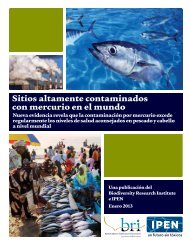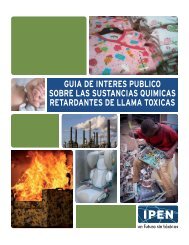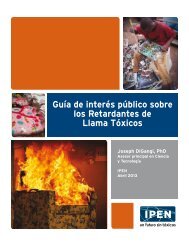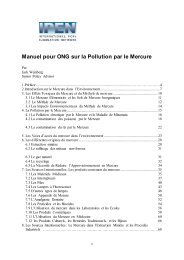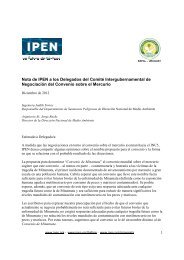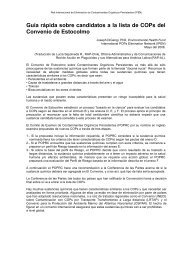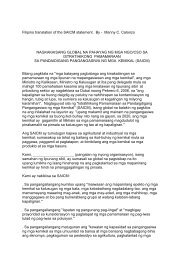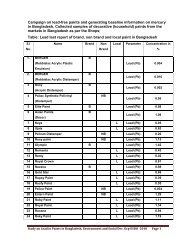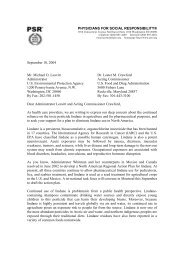The UNDP-GEF POPs Resource Kit - International POPs Elimination ...
The UNDP-GEF POPs Resource Kit - International POPs Elimination ...
The UNDP-GEF POPs Resource Kit - International POPs Elimination ...
Create successful ePaper yourself
Turn your PDF publications into a flip-book with our unique Google optimized e-Paper software.
Comments<br />
Step 4<br />
• Wherever possible, use should be made of existing committees/groups for formulating detailed action plans.<br />
• In order to be in a position to successfully develop the NIP, the following are considered key elements/conditions:<br />
- Availability of quality data to make informed decisions;<br />
- Commitment and political will to address the issue;<br />
- Commitment and meaningful participation of stakeholders, in particular industry at the national and international level;<br />
- A good understanding of technological options available and resources necessary to make use of these;<br />
- Human resources and financial means to effectively implement and enforce the NIP.<br />
• Responsibilities for developing <strong>POPs</strong> specific action plans should be shared amongst main concerned national parties,<br />
including government agencies, industry, research institutions, etc.<br />
• <strong>The</strong> following elements may be critical to the success of a <strong>POPs</strong> specific action plan:<br />
- Ensuring participation of local authorities in enforcement measures;<br />
- Awareness raising of the general public in particular in relation to the role they could play in addressing <strong>POPs</strong><br />
problems.<br />
• NIP implementation may include some of the following activities:<br />
- Development of a more detailed <strong>POPs</strong> inventory;<br />
- Drafting of new legislation/regulation;<br />
- Strengthening of compliance and enforcement of existing regulation;<br />
- Identification of specific eco-systems or populations at risk;<br />
- Evaluation and introduction of <strong>POPs</strong> alternatives;<br />
- Implementation of awareness-raising and education activities and establishment of mechanisms to involve local<br />
populations in the implementation of the plans;<br />
- Training and capacity building activities on various issues such as sound management practices of <strong>POPs</strong>, <strong>POPs</strong><br />
alternatives, conducting environmental impact assessment, effective legislation and regulation, good storage and<br />
management practices, risk assessment and risk management, etc;<br />
- Technology transfer activities;<br />
- Development of a national waste management strategy;<br />
- Monitoring, site auditing and other activities to ensure compliance and enforcement of regulations;<br />
- Development of safe disposal plans for existing stocks of <strong>POPs</strong>.<br />
• Some issues, e.g. illegal <strong>POPs</strong> trade would require coordinated action amongst several neighbouring countries.<br />
<strong>UNDP</strong>-<strong>GEF</strong> <strong>POPs</strong> <strong>Resource</strong> <strong>Kit</strong>-----------------------------------------------------------------------------------------127



